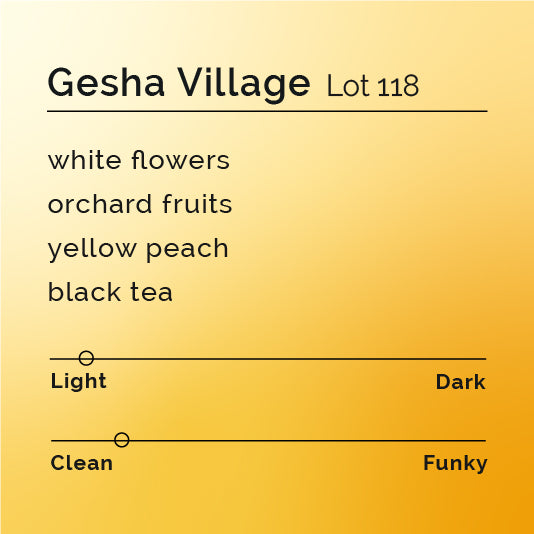Gesha Village - Lot 118
Description
Gesha Village is more than a household name (assuming those households include a specialty coffee drinker or two); it's a force. Coffee from Rachel's and Adam's farm in the jungle of western Ethiopia has found its way to the world stage numerous times, and for good reason. It is considered a "bucket list" coffee offering for many roasters around the world. And we here at Black & White have had the tremendous privilege of roasting coffee from Gesha Village Estate on numerous occasions, both for world barista competitors AND for all of you at home - and we do not take that privilege lightly.
MEET THE PRODUCERS | Most of you probably already know their story, but a short synopsis still bears repeating here: the Gesha Village project started as an effort by Rachel Samuel and Adam Overton to document native, wild coffee species growing in the Gori Gesha Forest in the Bench Maji zone, where the Gesha variety originated. Fast forward eight years, and the couple found themselves searching for the perfect piece of land on which to build the coffee farm of their dreams. They found that dream realized not far from that renown Gori Gesha forest they first visited in 2007. Today, the estate has grown to over 700,000 coffee trees and 30,000 native shade trees. With the partnership of the local Meanit Shasha Woreda people, the Gesha Village project has returned the value surrounding the name, "Gesha" back to the forests where the coffee first descended.
TRUST THE PROCESS | This naturally processed coffee first underwent rigorous hand-sorting to ensure that only the ripest, highest quality cherries remained. Then, the whole cherries were placed on raised beds to dry in the sun until they reached 11% moisture content. During this time, the cherries were consistently turned to ensure even drying. Everything is pretty standard operating procedure here, but something very unique happens to naturally processed coffees in this particular microclimate... they don't get funky. In fact, if you didn't know better, you might think you were sipping on a washed Panamanian Gesha when we handed you this cup of coffee!
TAKE A SIP | When hot, this really could be a washed Panamanian Gesha - notes of jasmine, bergamot, citrus, orchard fruits, and oolong tea make up what has to be one of the most archetypical Gesha coffees we've ever tasted. As the cup approaches a pleasantly warm temperature, the flavors are still very classically Gesha, but they become more complex as the acidity intensifies. Complex citrus fruits, like lemon and lime, yellow stone fruit, like yellow peach, and a subtle red raspberry note come into focus at this temperature. When cool, we can finally identify that this is a naturally processed coffee! Those fruited flavors, like red raspberry and peach, get bigger, acidity peaks, and the body actually becomes more full as the coffee cools. That oolong note gives way to black tea, and a new flavor, subtle rose, arrives fashionably late to the party.
___________________________________________________________________________
Origin | Bench Maji Zone, Gesha, Ethiopia
Producers | Adam Overton, Rachel Samuel, and Willem Boot | Gesha Village
Farm | Gesha Village
Process | Natural
Variety | Gesha 1931
Elevation | 1909-2063 masl



